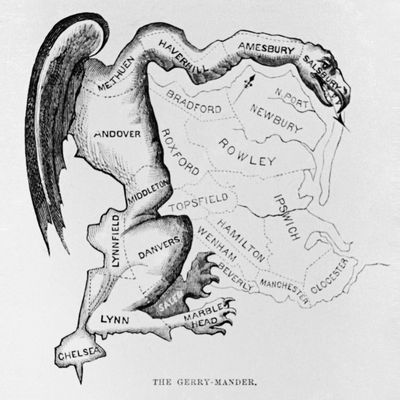
The U.S. Supreme Court famously dodged a big opportunity to rule on the constitutionality of partisan gerrymandering earlier this year. And with the key swing justice who was open to limits on the practice, Anthony Kennedy, retiring, presumably to be replaced by a standard conservative jurist like Brett Kavanaugh, the odds of SCOTUS doing anything about the unpopular and unsavory practice of map-rigging are low.
Perhaps the justices can be shamed, however, by fresh evidence of exactly how blatant partisan gerrymandering can become, and how indistinguishable it is from the racial gerrymandering that federal courts have proscribed. A new district court case from Michigan is revealing some ugly details about Republican efforts in 2011 to pack those people — Democrats and African-Americans — into a minimal number of congressional seats, as the New York Times reports:
Newly disclosed emails show Michigan Republicans angling to give their party a dominant position through gerrymandered maps and celebrating the plight of their Democratic rivals …
The emails, disclosed in a filing on Monday, boast of concentrating “Dem garbage” into four of the five southeast Michigan districts that Democrats now control, and of packing African-Americans into a metropolitan Detroit House district.
The emails are particularly useful in showing how racial and partisan motives for GOP gerrymandering have become interchangeable:
[A]n aide to former Republican Representative Thaddeus G. McCotter proposed swapping equal numbers of residents in two suburban Detroit districts to meet “the obvious objective — putting dems in a dem district and reps in a GOP district.”
“It will help increase the black population in the black districts because the former is 17% black while the latter is only 6% black,” he wrote.
Until lower courts began to consider the possibility that blatant partisan gerrymandering might be a problem with or without a racially invidious motive, it was common for Republican mapmakers to insist on their partisan intentions. This most famously occurred during North Carolina’s drafting of a congressional map, as the Charlotte Observer reported:
Rep. David Lewis, a Harnett County Republican and House redistricting leader, said at a meeting that he wanted the maps drawn “to give a partisan advantage to 10 Republicans and three Democrats because I do not believe it’s possible to draw a map with 11 Republicans and two Democrats.”
In Michigan, courts inclined to question GOP redistricting decisions have their choice of partisan or racial motives. But should they not find sufficient evidence of racial gerrymandering, and/or if SCOTUS continues to shy away from taking action against partisan gerrymandering, the Michigan case could help build support for another avenue for reform:
The newly unearthed emails could lend momentum to a proposed constitutional amendment to end gerrymandering, which is set to be on the ballot in Michigan in November. The amendment is written and promoted by a nonpartisan group called Voters Not Politicians.
If nothing happens to change the old system in Michigan or in other states that have not already adopted limits on legislative control of the process, then raw political power will likely determine the shape of districts during the next round of redistricting in 2021. But I’m guessing the future mapmakers will be more careful to cover their tracks.






























